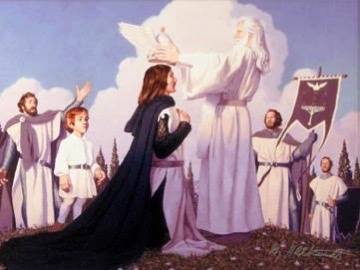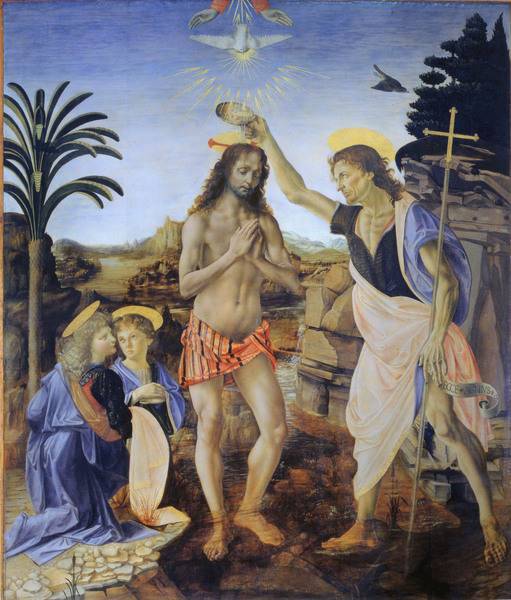Preached on the Fourth Sunday After Epiphany, January 28, 2024, at Prince of Peace, Wasaga Beach, and St. Luke’s, Creemore, Anglican Diocese of Toronto.
Readings for Today: Deuteronomy 18:15-20 ; Psalm 111; Corinthians 8:1-12; Mark 1:21-28

“But when you the sin against members of your family, and wound their conscience who it is weak, you sin against Christ.” (1 Cor 8:12)
Perhaps you’ve noticed that planning meals when families get together has gotten a lot harder these days. Everybody, it seems, has their own personal rules on what they will and won’t eat. As a case in point, our six year old granddaughter has recently decided that she is a vegetarian. We’re not sure where she got the idea from, possibly from her mother who generally won’t eat meat “if it comes from an animal with a face” but has been known to make exceptions.
At any rate, this is our granddaughter’s conviction and we feel that we have to respect it. The days when a parent or grandparent could say, “you’ll eat what’s on your plate and like it” are long gone, and I think for the better, because conscience and ethics have entered into the equation. We’ve gotten used to the idea that someone can be a vegetarian or a vegan for moral reasons, because they are opposed to cruelty to animals, or because they oppose methods of farming that are destructive to the environment. Likewise, as the world gets smaller, people of faith recognize that we have different ideas about food. I’m sure that ou wouldn’t invite a Muslim or Jewish friend over for dinner without asking them what they could or couldn’t eat.
So as you might have guessed by now, my homily today is on our lesson from First Corinthians and Paul’s remarks on food, specifically meat. Most biblical scholars think that First Corinthians is an answer to a series of questions that the members of that church had ent to him, Paul, as one of their teachers, to answer. In the case of chapter 8, Paul seems to be answering one or more questions about members of the church with different ideas about eating meat.
Meat would have been a rare thing to say on the dinner tables of the Christians in Corinth. It was rare because it was expensive, and most people in the Roman Empire were vegetarians by economic necessity. If you wanted to taste meat and could actually afford it, you wouldn’t go to a Loblaws or Woodland because they didn’t exist then. Most likely you’d go to a temple of one of the official Roman gods, like Jupiter, where the priests would sell cuts of meat from the animals sacrificed there. Some of these temples operated restaurants where you could go and eat meat from animals sacrificed to the pagan gods.
Well, you can see the problem for the Christians in Corinth if they wanted a nice steak. They had been taught by Paul and other Christian leaders that the idols were false gods, and that there was only Jesus Christ, the son of the living God. Paul says as much in our second reading: “for us there is one God, the Father, from whom are all things and for whom we exist, and one Lord, Jesus Christ, through whom are all things, and though whom we exist” (1 Cor 8:6). In contrast, Paul says, the temples of the Roman gods, like Jupiter, were just buildings, dedicated to idols that have no existence or meaning. So we can imagine that some of the Corinthian church would have thought, “well, if the idols are fake, then the sacrifices of animals to those idols is meaningless, and it’s just meat, so, I might as well go ahead and get my juicy steak from the temple of Jupiter and have a nice steak dinner.”
So somebody like this person could come home from the temple of Jupiter with a juicy cut of meat and a clean conscience. This is a person who has what Paul in our second reading calls “knowledge”. But, imagine someone else in the same church that isn’t so sure about all this stuff. Perhaps this person is a recent convert to Christianity and grew up believing in the Greek and Roman gods, Maybe they still believe that the Roman gods exist in some form, but are inferior to their new God, Jesus. Maybe this person believes that the temple of Jupiter is not an empty building but an evil building where an evil god lives. This person might believe that Jesus is a better god, but they still fear the contamination of the old Roman Gods. Paul would say that this person has a “weak conscience”, meaning simply that they are new in the Christian faith.
Now imagine that this new believer shows up at a Corinthian church potluck where the first person has brought a nice stew made from meat sacrificed to Jupiter. The second person will likely feel that the dinner is unclean because of the temple meat in the stew. This second person is what Paul calls a “weak believer” and the first person has put what Paul calls “a stumbling block” in their path.
So let’s say you’re a churchwarden in Corinth, you’re at the potluck, and the second person comes to you complaining about the first person. What do you do? How do you decide? If you weren’t sure and you wrote a letter to Paul, your answer would be our second lesson. Paul’s answer is that the first person should respect the beliefs of the second person. If your temple meat is going to offend the second person, then don’t bring it to the church pot luck. If your beliefs offend the second person, then you should moderate your behaviour and respect where the second person is. Otherwise, as Paul says, you’re sinning against members of your family, in this case, your church family.
Now to some of us, this part of First Corinthians, and much of this homily, might seem irrelevant. We get our meat from Loblaws, not Roman temples, so what’s the problem? But in fact the problems remain, they just have different moral occasions. Should I mock my granddaughter for calling herself vegetarian and try to change her mind by giving her a baloney sandwich, or should I provide her with a lunch that won’t offend her newfound convictions? Or, if my dinner guest is passionately opposed to veal because of they way they force feed calves, should I maybe not serve veal for dinner?
As another example, my son has a long history of problem drinking and I’m so grateful that he goes to AA and is now sober. My son also likes to host family gatherings and is a good cook. When we visit, we all bring water or soft drinks. Nobody would dream of bringing beer or wine. None of us want him to fall off the wagon None of us would want to be what Paul calls a “stumbling block” for him. That’s just good family practice. That’s the same rule of love that Paul speaks about.
Recently I heard a lecturer who was talking about conspiracy theories and how they are becoming more widespread thanks to social media. Social media also has the effect of putting us into groups where we only interact with the people we agree with. However, there are times, like family gatherings, where we have to sit with people we disagree with. If on one of these occasions, someone declares views on, say, the American presidential election that we might disagree with, are there ways that we might gently disagree with that person but not fight? Perhaps a disagreement on immigration could be reframed to discuss our common humanity.
Likewise in our church today we might hold different views on social justice, or climate, or gender. I had a gentleman in my last parish who disbelieved in global warming and felt that the church should not speak on political issues. I found it difficult to argue with him and did my best to say that God gave all of us a duty t care for God’s creation and that was something we might agree on. It’s possible for church members to disagree on some things if we can accept that Christ is Lord of all.
Paul’s letter to this ancient church in Corinth is fthus ull of lessons for our own very divided time. Yes, there are some views that, if hateful or just plain wrong, need to be forcefully addressed. But most of us, particularly in church disputes, as in family disputes, have as much in common as we hold in difference, otherwise, we would’t be church or we wouldn’t be family. Some people in disputes thrive on being right, come hell or high water. Paul is saying, don’t always just settle for being right. Try instead to love and respect the place your neighbour is in, and maybe together you can find your way to the higher ground where we stand with Jesus as brothers and sisters.







